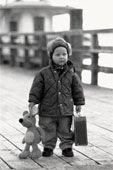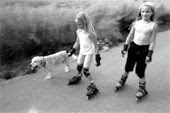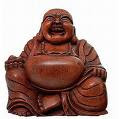 Every monkey has a mother, of one shape or another. And making the choice to become a mother means letting go. Letting go of that identity before her child came. Of whoever she is before a tiny bit of life shines back at her and grunts the hungry sound. Or wails the wet or cold.
Every monkey has a mother, of one shape or another. And making the choice to become a mother means letting go. Letting go of that identity before her child came. Of whoever she is before a tiny bit of life shines back at her and grunts the hungry sound. Or wails the wet or cold.Interrupted by my shortened attention span. Shiny! Let's go outside, chat with the neighbors, watch HGTV, even practice my short game.
Wanting to do anything that is easier than writing about my mother.
Aren't there enough written words? Haven't all the great ones been taken? Looking for satisfaction in smaller and smaller things, I feel myself shrinking.
 This is a good thing from my perspective. I'm as suspicious of self importance as I am of self deprecation. Whatever process puts the self in the center immediately brings to mind the ego.
This is a good thing from my perspective. I'm as suspicious of self importance as I am of self deprecation. Whatever process puts the self in the center immediately brings to mind the ego.Who do I think I am?
Love that question and could write about that for hours.
And that gets me neatly around what I do not want to write about.
My mother.
The cliche is true. Every woman in mid life endures looking in the mirror and sees her mother staring back at her. If the first half of my life was about reacting to my father's faults and challenges, does the second half need to be about my mother's?
Really, any activity - shopping, voluntary surgery, organizing the spice drawer, talking about your grandchildren, planning cruises, contemplating the universe, imagining health crises, avoiding holiday celebrations - anything but writing about my mother.
I thought we were finished. All is forgiven.
She did the best she could with the hand she was dealt and had some wonderful characteristics that made her remarkable, gentle, amazing, lovable and endearing. So why isn't that the part that I remember?
 Why do I only look back at this stranger's life and poke holes in her psyche? Could I ever really appreciate having English as a second language? Or living in a community where the Catholic church set the tone and tempo of my every waking moment?
Why do I only look back at this stranger's life and poke holes in her psyche? Could I ever really appreciate having English as a second language? Or living in a community where the Catholic church set the tone and tempo of my every waking moment?Helen, her given name, told me frequently that she grew up in the moral equivalent of the Middle Ages. Pisek was a reconstituted medieval Czechoslovakian village at the edge of North Dakota, not far from the Canadian border . She was born in 1917 to immigrant parents, the third child of eight.
Good news is they bathed in birth order, so the water wasn't completely gross and cold by the time she got there.
Her older brother began school not speaking a word of English. Fortunately, the one room school was run by a teacher who was bilingual in Czech.
The town revolved around the annual calendar of the church's feasts, saints, music and decisions were driven by the Catholic take on the Bible. Talk about fiction.
Whoa. My mom grew up in a cult.
And most of what appears below will only dance around these issues.
My grandmother Mary nearly died in the flu of 1918, which meant that my uncle and aunt and mom and her younger sister Margaret were cared for by the live-in "girl" who helped out with the household chores and cooking.
My mom had a nanny, but in her experience that was a bad thing, since she imagined that having her mother's attention would have been a much better deal. Having met my grandmother, I'm not so sure about that.
Ultimately grandmother survived the flu and went on to have four more sons. This was a big deal for my mom as her brothers were the "chosen" ones, as she was fond of reminding us. Men had special status in her cult, where Christ got top billing and Mary was more like an opening act for the big show.
I suppose I didn't encounter Grandma Mary under the best of circumstances, since it was later in her life and she didn't appear to be a very jolly person to begin with. We shared my room when she came to "help out" when mom was hospitalized.
Suffice to say I wasn't feeling particularly generous, had a new transistor radio and a defiant attitude towards the chaos around me. Of course how many eight year olds are interested in other people's problems?
This is the part of the story where I turn away.
My mother had issues. This isn't a surprise to me as an adult. It turns out that everyone does. I'm probably still attached to the story of who she was. And no matter how kind the words, the black and whiteness doesn't really serve itself up willingly to the page.
How can I characterize her experiences without just making things up from my side? Can I ever really know what was happening on the inside?
 "All of human experience is subjective and memory is a perilously fragile vessel for collective truth." Mark Frost
"All of human experience is subjective and memory is a perilously fragile vessel for collective truth." Mark FrostThere are only stories of events that were filtered by the simplicity of a child's understanding. Perhaps I'm entering the realm where fiction serves to speak on behalf of truths that are too painful to claim as my own?
Through fiction could I presume to open these doors and pretend that a yet unnamed character will sort out my mother's story?
Mother is gone some fifteen years next spring and she was never a great one for explanations anyway.
She'd been raised to accept what the church offered, and would repeat the truisms of her age and upbringing. This usually meant assigning blame to my father for whatever misfortunes she'd endured.
The immigrant history, martyr mother, lost child of eastern Europe, gifted musician of hymns exalting the life promised in heaven by a god who gave men a place of honor and women a place of servitude.
I suddenly understand why my sister is a poet. None of this territory easily lends itself to linearity.
All is forgiven.
My throat closes with unshed tears. Every story is based on fiction.
The perilously fragile vessel that was my mother.





















 What a gift!
What a gift! 




